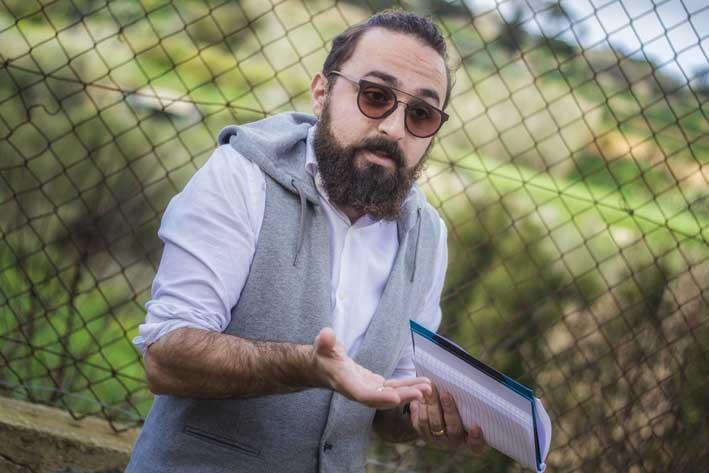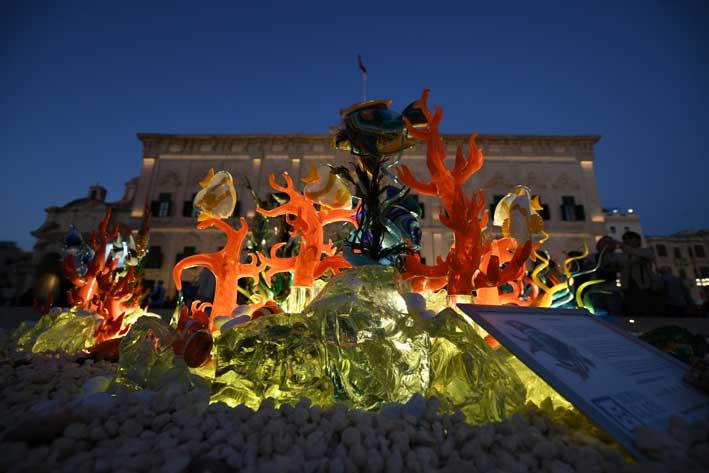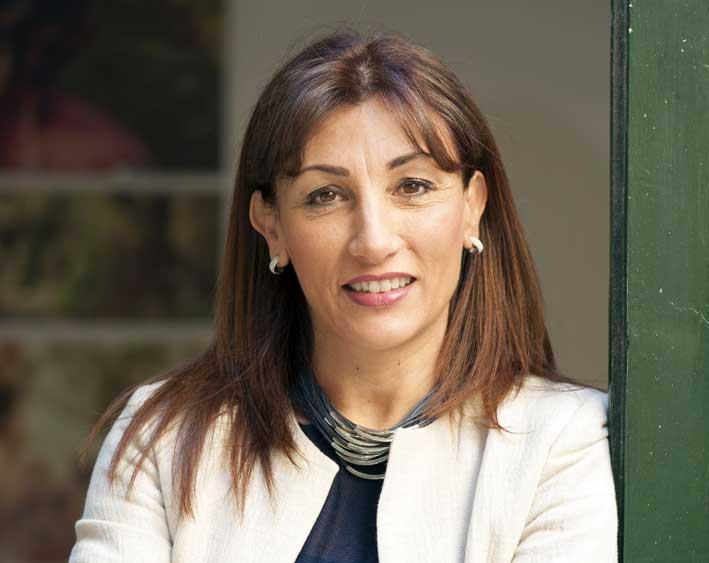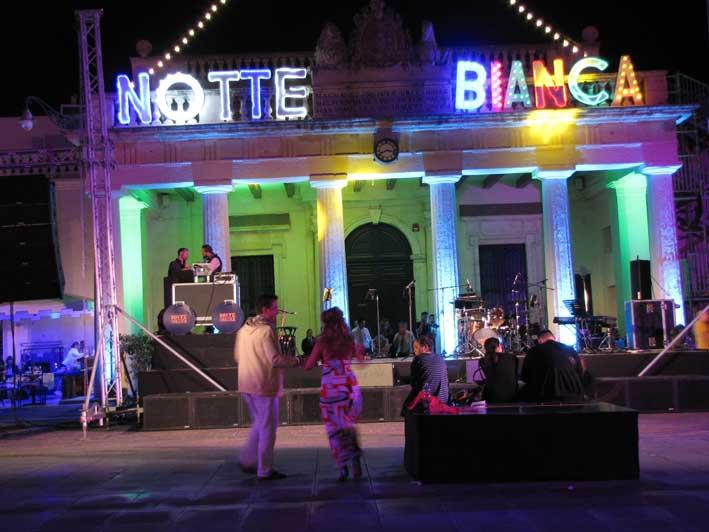It is that time of year again when local and foreign artists join forces in a celebration of arts, culture and entertainment, hosted in our capital city under the name of Notte Bianca.
This year's event has added significance since it is the year Valletta is celebrating being the European Capital of Culture.
In fact Notte Bianca is expected to be the best to date with the highest ever audience turnout expected.
The programme will include an impressive range of local and international acts with five renowned foreign artists set to perform during this year's edition on Saturday, October 6.
Notte Special, at St George's Square, will host the main stage of the event, while rock and heavy metal enthusiasts can visit Notte Metal.
A definite popular area will be the Notte Reggae where one will be able to chill out to the Rastafari rhythms.
The Notte Folk and Notte Electronic stages will complete the music genres for the evening.
Notte Bianca will also feature theatre and dance performances, slackline acrobatics, workshops, poetry, flamenco, clowning, burlesque, science, clay, film, and a special lighting installation.

The last hurrah... interview with outgoing artistic director Sean Buhagiar
This is your sixth year as Artistic Director for Notte Bianca. How has Notte Bianca evolved through the years from its first edition?
"Notte Bianca is a festival that has started out as an experiment and I think it is a successful experiment and has shown that when the culture and the arts are made accessible it has a huge following.
"Notte Bianca has evolved as a season-opener for events for the rest of the year. It is a festival where emerging artists with great potential are given a platform to showcase their work and also an opportunity for well-respected local and international artists to perform in front of huge audiences.
"This aspect of Notte Bianca - bringing together all these artists - is appreciated by the Maltese public and kept this event growing each year.
"Being in its 13th edition Notte Bianca remains the go-to event that never got stale. It has also evolved into the largest cultural event on the island."
What does Notte Bianca mean to you?
"To me Notte Bianca means a very busy summer and also a very big platform to experiment and play with.
"Being artistic director to such an established event and having such a huge audience gives you the opportunity to bring to the public new works while being able to gauge what went down well and what did not.
"Notte Bianca is a barometer to get to know more what the public wants. The event has always been a very fun way of artistic direction and it was a privilege for me to be in charge of such a huge event.
"It also became a very large part of my year with the logistics behind it being a big challenge and a huge learning curve."

What were the main challenges to make an annual event of such magnitude better than the previous year?
"This is a big challenge because every year we say it is the biggest one yet. This year culture will be taking the front seat since Valletta is the European Capital of Culture. It is the biggest challenge ever.
"It is a huge responsibility and being the largest event of the island where thousands of people attend every year, there is an added responsibility to change so that Notte Bianca remains fresh and innovative.
"Another challenge is finding artists who are willing to give their work fresh aspects and to find new artists and mix them in with international artists on the same night.
"We are also striving every year to give Notte Bianca an international dimension."

One can say that Notte Bianca is the flagship event in the local cultural calendar. What is the significance of Notte Bianca to local artists?
"Notte Bianca is an opportunity for local artists to expose their work to a huge audience and in the process make those attending interested in works of these artists. It is also satisfying for local artists to be part of a significant event like Notte Bianca."
With Valletta being the European Capital of Culture for 2018, what should the Maltese public expect for this year's edition?
"The public should expect a more European Notte Bianca. We are working with bands from Germany, Italy and England.
"We wanted it to be a more European event because we want to think European and give the opportunity to local artists to work with European artists who are not necessarily household names in their genre.
"Our artists will be able to see the reality - fellow artists from other countries sometimes share the same struggles in their bid to perform in gigs and other events."
Are there any new initiatives from previous years? Any surprises?
"Every project is different. We are opening the Maltapost Museum, which is hosting a very interesting project named Posta Poeżija. In fact it is the first time that the entrance is free of charge. We also have the Arkivji Notarili, being opened for the public for the first time.
"However, I think the main initiative this year are the five curated stages with five international bands performing on each stage along with local musicians. These big huge stages with such a great line-up of international artists is surely this year's big surprise."
This year's Notte Bianca will be your last as Artistic Director. Your name has become synonymous with this event. Why are you leaving your post?
"I believe that after a certain time, one needs to let go of something for it to become its own thing. This was my six-year vision for Notte Bianca and I have always said that I would like to continue until the Capital of Culture year.
"Now I feel there should be someone else taking over to freshen things up. The reason I am leaving is because I do not believe in building an empire, but after six years I feel it is time to let someone else come in and maybe create something different.
"Ultimately the buck always stops with the artistic director so even though we changed things every year the vision was my vision so it is time for a new vision to come to the fore."
Looking back, what were your highlights as Artistic Director? Are there any regrets?
"I think there were many highlights to be able to mention them all. I have some favourite projects and we worked with many different art forms. I have seen artists grow with Notte Bianca, that must be my biggest highlight - giving a platform to these budding artists.
"The biggest regret is that there were so many projects that I wanted to do but did not happen for one reason or another, be it budgets, schedules or people who we could not work with.
"However, I do not have major regrets. It is very satisfying when you think that Notte Bianca has continued to grow every year and we also managed to get big international names to perform with our local artists giving them invaluable experiences."

Enter Festivals Malta... interview with director Anabelle Stivala
Let me start by congratulating you, being the first director of Festivals Malta. One can say that Festivals Malta is still in its infancy. What is the role this entity will be playing going forward?
"Festivals Malta is essentially a new entity that was previously known as the Festivals Directorate, which has been hived off from Arts Council Malta.
"The rebranding of the Festivals Directorate is one of the key actions in the Arts Council Strategy Create 2020 and the hiving off of the directorate from its 'mother entity' ACM, is a strategic attempt to facilitate the growth of more than 180 cultural activities across eight festivals and five national events, leveraging a team of 20 talented professionals and eight artistic directors, within Festivals Malta.
"This new Public Cultural Organisation (PCO) has a vision to nurture creativity, professionalism, participation and education in cultural festivals. It strives to continue to make festivals an integral part of Maltese social life while offering a platform to local performing talent, particularly youth, and nurtures its growth.
"This PCO will drive for greater focus on excellence and will also be a focal point for outreach to other international festivals, providing opportunities for local artists.
"Festivals Malta will enable cooperation between events and festivals, regardless of their source, to promote artistic expression and democratic expression and this same cooperation will be tapped into to create economies of scale between festivals."
This will be the first time Notte Bianca will be under the remit of Festivals Malta. Will there be any significant changes from previous editions?
"Notte Bianca is one of Malta's largest annual arts and culture events, which once a year lights up the Valletta cityscape in a way like no other with a spectacular celebration that is open to all.
"The main objective of Festivals Malta is to create unique cultural experiences guaranteeing a memorable night that truly holds something for everyone, engaging a wider audience.
"Notte Bianca is a wonderful way to increase participation, reach out to younger audiences and all segments of society. It also ensures a Maltese cultural product that is engaging, accessible and varied and this is where the significant changes lie - in the choice of artists, artistic projects selected, inclusion of new spaces and site specific performances."

What are your thoughts and plans for the future of Notte Bianca - the most popular and most awaited culture event on the island?
"There are various ideas which will be brainstormed after this year's edition. Whatever decisions which will be taken, Festivals Malta has a commitment to strengthen the current portfolio of festivals and events bringing in new ideas and innovation and further dialling up audience engagement and participation.
"Notte Bianca like all other cultural festivals, will be further developed into an ongoing creative platform for Maltese and international artists and creative practitioners through the commissioning of new work, in partnership with national and international arts organisations, while increasing participation locally with a more focussed and effective marketing plan, based on audience segmentation."
With Valletta being the European Capital of Culture, is the significance of Notte Bianca much bigger this year?
"The title of Capital of Culture, gives a sense of belonging to all citizens while it also highlights the importance of culture in a city, and Notte Bianca celebrates the city, its built heritage and all art forms, engaging citizens in the process.
"This year's programme will offer a burst of cultural energy in a most entertaining manner, making this cultural event particularly significant for 2018.
"Moreover, with the energy and drive spurred on by the European Capital of Culture title, the opportunity exists to leverage the significant investment in events for years to come and continue a legacy to sustain this investment for the future of arts and culture in Malta."
How will Festivals Malta aim to improve the quality of events like Notte Bianca, The Three Palaces, The Malta Jazz Festival, the Malta International Festival and Għanafest, among others?
"Growth brings with it the need for self-reflection about purpose, vision, strategy and deliverables. This is what is at the heart and soul of the creation of Festivals Malta.
"Being at the crossroads, we looked at ways to not only increase audiences but to set deeper roots in the community and its cultural development. Festivals Malta is committed to ensure that it provides the local community and visitors with the opportunity to experience and participate in a diverse range of vibrant, stimulating cultural events.
"With this in mind, the entity resolved to undertake the 'Festivals and Events Strategy' project. The organisation took on the task to develop a framework which will provide a vision for Public Cultural Organisations, festival promoters and event organisers to follow.
"The framework addresses various objectives of how to improve the festival experience including audience development, festival stakeholder issues, related festival management strategies, the introduction of a green policy and new ways of capitalising on site specific projects.
"This will impact all our festivals, placing Malta on the international map as a festival island."
What should the public expect at this year's Notte Bianca and what is your message to those attending?
"All those who visit Valletta on the evening of Notte Bianca can expect over 65 events created by over 350 local and 6 international artists, a light installation at the entrance to Valletta the likes of which we have not seen before, five main music stages which will be featuring a diverse musical assortment for everyone to enjoy, featuring big names including local favourites.
"In my capacity as Director of Festivals Malta, I am proud that the 13th edition of Notte Bianca is presenting so many artistic projects which are accessible to all sectors of society and that our unique capital city, which this year is also the European Capital of Culture, yet again becomes a stage for an extraordinary programme that embraces all art forms equally, bringing forth the Maltese artist as a professional creator.
"There is no better way to experience Valletta."
For more information on the programme and the venues, visit www.nottebianca.org.mt.
Notte Bianca is organised by Festivals Malta within the Ministry for Justice, Culture and Local Government, with the support of Valletta 2018 Foundation, Valletta Local Council, MapfreMSV Life, and Farsons